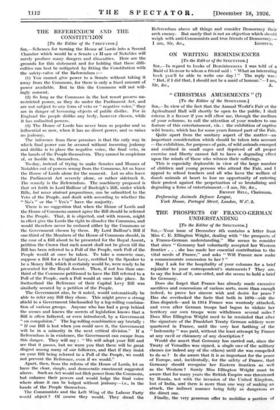THE REFERENDUM AND THE CONSTITUTION
[To the Editor of the FPECT tTOR.]
Sm,—Schemes for turning the House of Lords into a Second Chamber which would be a Senate cr Huse of Notables will surely produce many dangers and diniculties. Here are the grounds for this statement and for holding that these diffi- culties can best be mitigated by fitting the Constitution with the safety-valve of the Referendum
:-
(1) You cannot give power to a Senate without taking it away from the Commons, for there is only a fixed amount of power available. But to this the Commons will not will- ingly consent.
(2) So long as the Commons in the last resort possess un- restricted power, as they do under the Parliament Act, and are not subject to any form of veto or " negative voice," they are in danger of becoming objects of public dislike. For in England the people dislike any body, however chosen, while it has unlimited powers.
(3) The House of Lords has never been so popular and so influential as now, when it has no direct power, and so raises no jealousy.
The inference from these premises is that the only way in which final power can be secured without incurring jealousy and dislike is to place the negative voice, the final veto, in the hands of the People themselves. They cannot be suspicious of, or hostile to, themselves.
To-day, instead of trying to make Senates and Houses of Notables out of powers wrung from the Commons, let us leave the House of Lords alone for the moment. Let us also leave the Parliament Act severely alone, or rather sidetrack it. The remedy is the Referendum. The machinery proposed is that set forth in Lord Balfour of Burleigh's Bill, under which Bills, but never abstract propositions, can be submitted to the Veto of the People, and dealt with according to whether the " No's " or the " Yes's " have the majority.
There is no suggestion that when the House of Lords and the House of Commons cannot agree the Bill should be referred to the People. That, it is objected, and with reason, might in effect give the Lords the right to dissolve the Commons, and would therefore never be endured either by the Commons or the Government chosen by them. By Lord Balfour's Bill if one-third of the Members of the House of Commons should, in the case of a Bill about to be presented for the Royal Assent, petition the Crown that such assent shall not be given till the Bill has been referred to a Poll of the People, such Poll of the People would at once be taken. To take a concrete case, suppose a Bill for a Capital Levy, certified by the Speaker to be a Money Bill, which it certainly would be, were ready to be presented for the Royal Assent. Then, if not less than one- third of the Commons petitioned to have the Bill referred to a Poll of the People, such a Poll would at once take place. In Switzerland the Reference of their Capital Levy Bill was similarly secured by a petition of the People.
The Government also, be it noted, would automatically be able to refer any Bill they chose. This might prove a strong shield to a Government blackmailed by a log-rolling combina- tion of various groups. Anyone who has had a peep behind the scenes and knows the secrets of legislation knows that a Bill is often fathered, or even introduced, by a Government "on compulsion." The log-rolling combination say brutally : " If our Bill is lost when you could save it, the Government will be in a minority in the next critical division." If a Referendum is in existence, the Government can escape from this danger. They will say : " We will adopt your Bill and see that it passes, but we warn you that there will be great disgust among many of our followers, and that if they insist on your Bill being referred to a Poll of the People, we could not prevent the Reference, even if we would."
Apart, then, from the reform of the House of Lords, let us have the clear, simple, and democratic enactment suggested above. Such an Act would not filch power from the Commons, but enhance their powers and would lodge the final voice where alone it can be lodged without jealousy--i.e., in the hands of the People themselves.
The Communists and the Left. Wing of the Labour Party would object ? Of course they would. They dread the Referendum above all things and consider Democracy their arch enemy. But surely that is not an objection which should weigh with anti-Communists and true friends of Democracy.—










































 Previous page
Previous page